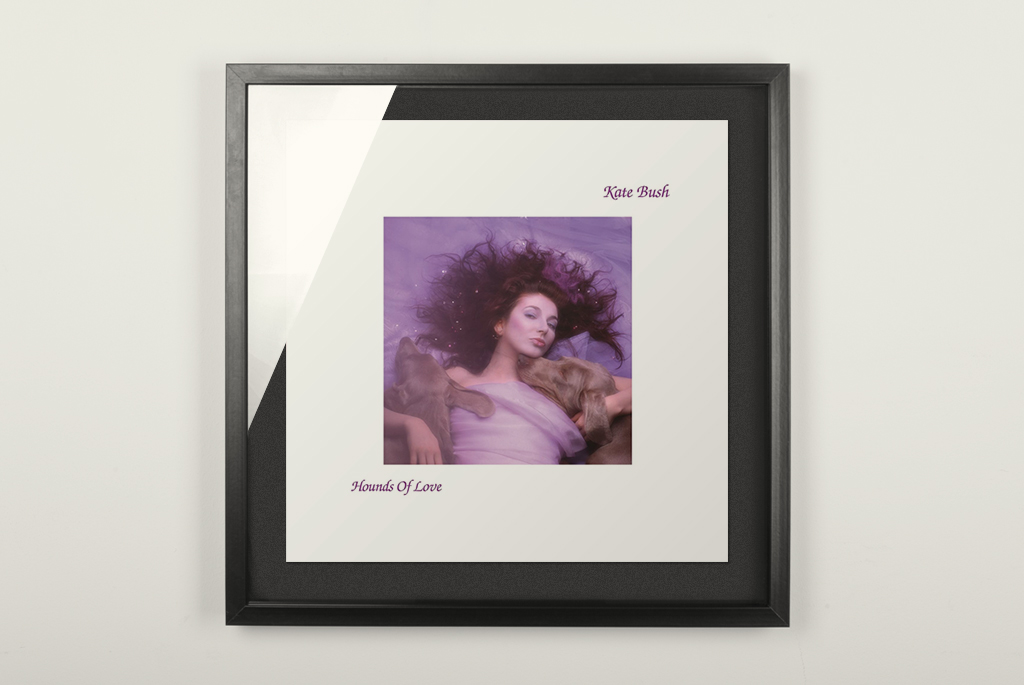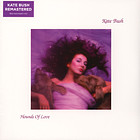Let’s face it: many long-playing records are actually a fleeting pleasure. Some you devote one, maybe two hours of your time to and then move on to something else. Most of them don’t even get listened to in their entirety, but are scanned for personal favourites, which don’t necessarily have to be identical to the hits that may have been released in singles form. And then there is another type of albums – an almost vanishing minority in quantitative terms compared to the categories of LPs already mentioned – which, once put on, remain on the turntable for a long time. No sooner have they been played than they get flipped over again. It is not uncommon to find them transferred to another medium that resemble the form of an endless loop more than the record. »Hounds of Love« is such an album.
When Kate Bush released her fifth studio album some 35 years ago, in September 1985, she had long since become more than a global star. Having been supported by Pink Floyd guitarist David Gilmour since he heard Catherine Bush’s poems set to music, then 15 years old, she was signed by EMI in 1976 – when she had just turned 18. Two years later, »The Kick Inside« was released; with the pre-release single »Wuthering Heights«, inspired by Emily Brontë’s novel of the same name and written by Kate Bush herself, like all the songs on her debut album, a woman’s own composition conquered the top spot in the British singles charts for the first time.
The following albums »Lionheart« (1978), »Never For Ever« (1980) and »The Dreaming« (1982) could not quite match the commercial success of »The Kick Inside«, but they still consolidated her reputation as an exceptional artist. Beyond the usual registers of synth-pop and art or prog rock, Bush created her own genre, which resisted any attempt at reduction, despite her marked interest in folk elements.
Similarly idiosyncratic and complex is the thematic world of her lyrics: motifs of fairy tales and legends enter into a specific mix with decidedly feminist, socially critical positions, which also earned her the status of an LGBTQ+ icon early on. However, she soon resolutely avoided the usual exploitation mechanisms of the time – her »Tour of Life« in the spring of 1979 will remain her only one. With the production of »Never for Ever«, Bush begins to work with the Fairlight CMI, the first digital synthesiser with a sampling function, whose benefits she discovers as a background singer on Peter Gabriel’s third solo album. The credits of »The Dreaming« already identify Kate Bush as sole producer.
Artistically ambitious and challenging, the record falls short of previous albums in terms of sales, to EMI’s disappointment. Bush then turned her back on the public and moved from London to a small country house on the Sussex coast, where she set up a professional 48-track studio in a barn. From January 1984, the songs for »Hounds of Love« were written here, which is considered by many fans to be her unrivalled masterpiece, despite the singular position of her early work and the enormous relevance of her two albums released after the turn of the millennium, »Aerial« and »50 Words For Snow«.
»Hounds Of Love« sei das »St. Pepper« des Digitalzeitalters, so der US-amerikanische Journalist Barry Walters – ein Autorenalbum, wie es nur einmal in einer Dekade vorkommt
In fact, »Hounds of Love« is also her most successful album to date. The opening alone, »Running Up That Hill (A Deal with God)«, with its irresistibly rolling Highland drumbeat that only varies at the dramaturgically right places to great effect, and with the ingenious lines »And if I only could / I’d make a deal with God / And I’d get him to swap our places«, sends a shiver down your spine every time – a song for eternity.
Unquestionably a love song, however, »Running Up That Hill« asks questions like, »Is there so much hate for the ones we love?/Tell me, we both matter, don’t we?« Analogously, she underlays her bell-bright timbre with downwardly transposed tracks of her voice, thus subverting both her image and gender barriers by means of sound synthesis and digital versions of herself.
Three further hits, also released as singles, follow in the form of the title track, »The Big Sky« and »Cloudbusting«. They seem like stand-alone chapters of a novel, but are related to each other, revealing Bush’s poetological conception; each one would be worth an essay on its own. In between, there is »Mother Stands for Comfort«, one of the most touching songs on this touching album, which already provides a glimpse of the complementary, darker B-side of the record. The duet between Bush’s manipulated soprano with the fretless, »singing« bass of Eberhard Weber – long-time sidekick to Jan Garbarek, who flew in specially – remains unrivalled even in the context of this marvel.
It is no coincidence that Werner Herzog and Terry Gilliam, among others, are mentioned in the album’s credits. From the beginning of her career, Bush’s interest has been in an interweaving of different media – music, costumes, setting, dance – for the purpose of heightening intensity in expressing the complexity of a larger, more comprehensive whole. »She gets it straight from the universe,« reads one of the most apt comments on YouTube.
In the video for »Cloudbusting«, Donald Sutherland is seen in the role of the Austrian-American, Freudo-Marxist psychoanalyst Wilhelm Reich, while Bush embodies Peter Reich, the son of the inventor of orgone therapy. The unlikely accumulation of iconic hits on the A-side, which revolves around the theme of self-discovery, is contrasted with »The Ninth Wave«, a kind of mini-concept album on the B-side. It describes in five eerie, even more closely interwoven song miniatures how a woman dreams that she falls through the ice while ice skating and is caught under the sheet of ice until the sun rises again with »The Morning Fog«: Hyper-real daydream on one side, surreal, even nightmarish nightlife on the other, intertwined like an endlessly woven ribbon.
»Hounds of Love« is the »Sgt. Pepper« of the digital age, according to US journalist Barry Walters; an author’s album that comes along only once in a decade. Childhood fantasies and sexual identities, family history and political consciousness, natural phenomena and cultural myths, birth, death and rebirth – Kate Bush offers the listener a complete life condensed into a single day with »Hounds of Love«, like James Joyce did with »Ulysses«. A once-in-a-century novel in the form of a record that transforms listeners into readers and vice versa – an album that can save lives.










